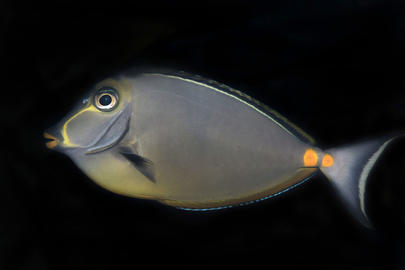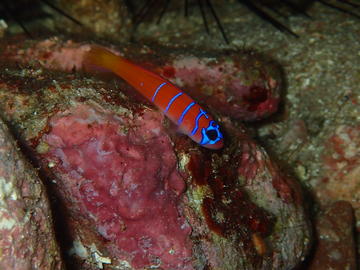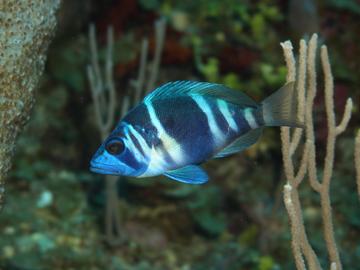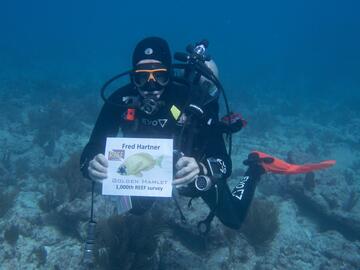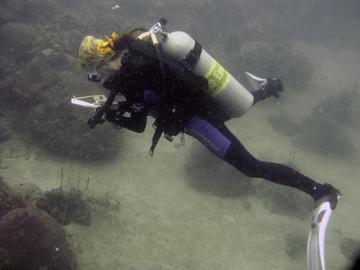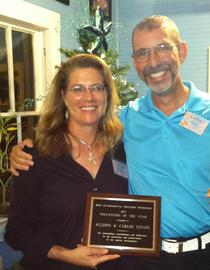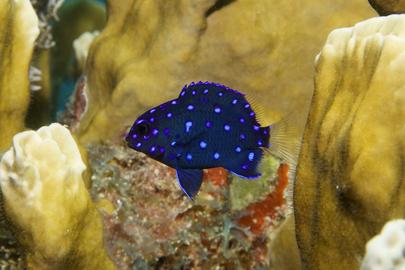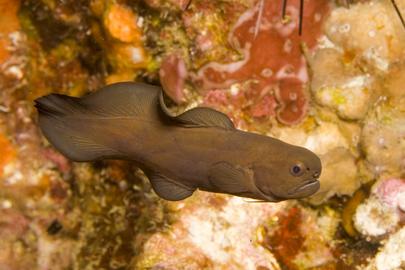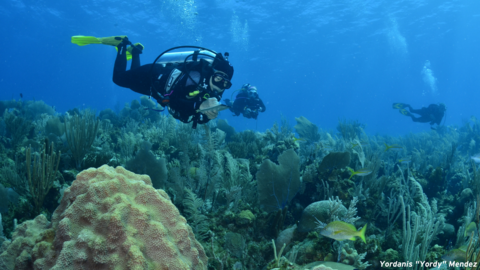In April 2018, two non-native marine fish species were live-captured from South Florida waters, including an Orangespine Unicornfish (Naso lituratus) in Key Largo and a Lagoon Triggerfish (Rhinecanthus aculeatus) in Fort Lauderdale. Both fishes, native to a wide range in the tropical west Pacific, were collected separately through a collaborative effort between REEF, Phillip and Patricia Frost Museum of Science, and the United States Geological Survey (USGS).
Current search
Search found 195 items
- tropical western atlantic
- (-) Remove e-News article filter e-News article
REEF Fishinars are fun, live, interactive webinars, open to anyone who wants to learn about ocean life. At the beginning of May, we presented a beginner's course covering 60 most commonly seen fish species in the Tropical Western Atlantic (the survey region including Florida, the Caribbean and the Bahamas). Each session of this four-part series was recorded, so if you missed them or want to watch them again, you can view them any time online.
Are your gills drying out in self-quarantine? Grab your laptop, tablet, or even a smartphone and join us for our next Fishinar, Fishes of Guanaja, on Thursday, April 16 at 8:00pm EDT! Instructor Janna Nichols will teach you tricks to identify the fishes of deep walls and tranquil gardens of Guanaja, located in the Bay Islands of Honduras - part of our Tropical Western Atlantic survey region. Fishinars are free webinars that will teach you the finer points of fish ID.
Congratulations to Fred Hartner, who recently joined the Golden Hamlet Club! This distinguished group is made up of highly dedicated volunteers who have conducted 1,000 or more REEF surveys as part of the REEF Volunteer Fish Survey Project.
REEF members are at the heart of our grassroots marine conservation programs. Over 43,000 divers, snorkelers, students, and armchair naturalists stand behind our mission.
This month we highlight Itziar Aretxaga (REEF member since 2003). Itziar has conducted 263 REEF surveys in three REEF regions, and she is a member of the Advanced Assessment Team in the Tropical Western Atlantic. Here's what Itziar had to say about REEF:
When and how did you first volunteer with REEF?
We are proud to announce our 2013 Volunteers of the Year, Carlos and Allison Estapé. Carlos and Allison joined REEF in 2008, and collectively, they have conducted 108 surveys. They call the Florida Keys home. As Tropical Western Atlantic REEF Advanced Assessment Team members, skilled lionfish hunters, expert underwater photographers, and PADI Open Water Scuba Instructors, this diving duo is instrumental to REEF’s fieldwork conducted in the Upper Florida Keys and they are avid REEF ambassadors.
During my first week at REEF as a Marine Conservation Intern, I gained a plethora of fish identification knowledge. My previous dive experience has been in the Pacific Ocean, so I had not seen most Tropical Western Atlantic fish underwater before. To practice, I constantly reviewed presentations and underwater photographs. I was eager to get in the water and put my identification skills to the test! I recently had the opportunity to get out on the water in Key Largo, alongside three other REEF interns: Riley, Amelia, and Stacey.
For nearly three decades, REEF has welcomed more than 150 young adults to the REEF Campus to spend a semester immersed in marine conservation projects. This month, we highlight former Marine Conservation Intern Sarah Goldman. Read on to hear about her time at REEF and how her REEF internship helped to shape her career.
When were you a REEF intern?
Fall 2002 with fellow intern Julie Brown.
Meet our first Fish of the Month for 2022, the Black Brotula (Stygnobrotula latebricola)!
2023 marks the 30th anniversary of the REEF Volunteer Fish Survey Project. Since its launch in 1993, this citizen science program has generated one of the largest marine life databases in the world through marine life sightings surveys conducted by volunteer divers and snorkelers. A key aspect of the project's success and impact is that REEF data are available to everyone.

